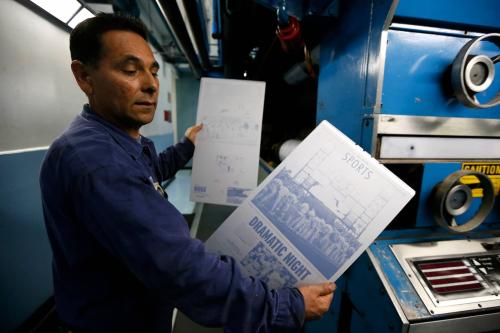The early 21st century has witnessed a sea change in the nature of employment and in the shape of the corporation in the United States. Employment has shifted from the career, to the job, to the task. In this paper, Jerry Davis argues that the death of the career and the rise of the gig economy are directly connected to changes in the shape of the American corporation—and that policymakers must recognize these shifts if they are to succeed in fostering job creation in 21st century America.
For most of the 20th century, the balance of power in American corporations favored management and labor, while dispersed shareholders were treated as junior partners. This coalition supported the postwar boom, in which corporations provided stable long-term employment, health and retirement benefits, and opportunities for upward mobility. However, widespread takeovers in the 1980s signaled a shift in power toward shareholders at the expense of labor.
As the pursuit of shareholder value became the primary purpose of corporations, organizational objectives became increasingly detached from the creation of employment, and the shape of the traditional corporation shifted significantly. Corporations with tiny employment rolls and assets, such as Facebook, now achieve vast market capitalizations, while large employers, like Kroger, often have modest market caps.
Small firms are now pervasive. Policymakers have attempted to spur growth and job creation by easing the path to public listing. But as Davis demonstrates, firms that have gone public since the turn of the 21st century tend not only to start small—but to stay that way. From the time they went public until 2014, or they left the market, the median IPO company grew its global employment by 51 jobs.
It must be acknowledged that today, labor inputs are available on demand: by the end of 2014, Uber had more driver-partners in the U.S. than General Motors had employees. Davis argues that the possibilities of just-in-time labor are likely to further change the nature of employment, with the biggest shifts likely occurring in retail, transport, and food service—those few sectors that continue to host large-scale corporate employers. Corporations, says Davis, are job creators only as a last resort.
What is good for shareholders may not be good for employment, Davis concludes. And today’s policy efforts to create good jobs are no longer aligned with shareholder capitalism. The challenge for those that seek to create economic security for the future, Davis argues, is to recognize the mismatch between our old model of the economy and the nature of 21st century enterprises. His specific recommendations include abandoning the idea that entrepreneurs are job creators and that easing the path to IPO will create employment.



